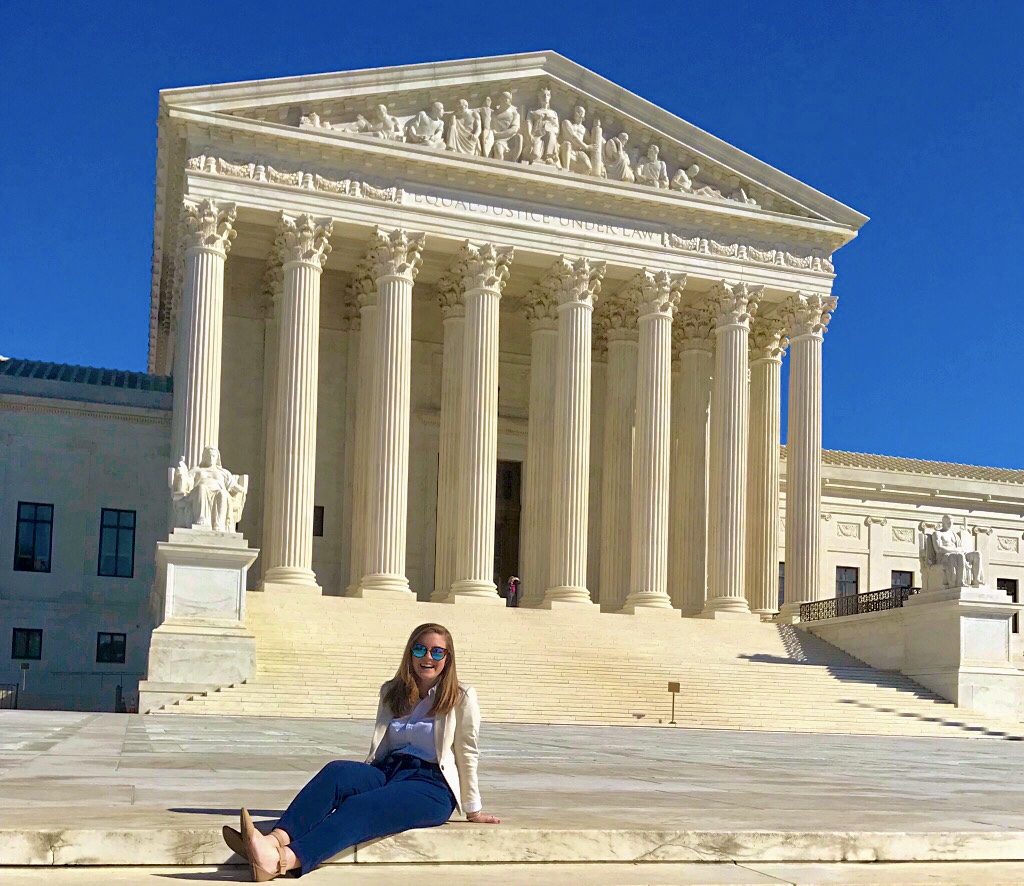By Brooke LePage ’19
Contributing Writer

Brooke LePage ’19 poses in front of the Supreme Court building in Washington. Photo courtesy of Brooke LePage ’19.
Public Policy and Law is one of the more popular majors on Trinity’s campus. But, what exactly is it and how is it different from political science?
Before coming to Trinity and becoming a public policy major, I asked myself all of these questions. I would soon learn that Public Policy and Law is an interdisciplinary version of political science. This means that rather than only taking public policy courses, students take approved courses in various departments to complete their requirements in order to be successful in fields relating to policy, law, or non-profit organizations and advocacy.
The major starts off with core classes such as “Introduction to American Public Policy,” “Fundamentals of American Law,” “Research & Evaluation,” and “Law, Argument & Public Policy.” Beyond these core classes found in the Public Policy Department, students are given general requirements such as ethics, quantitative, or legal history, which allows them to take courses in departments such as political science; women, gender, and sexuality; and economics.
The benefit of the Public Policy and Law major, much like that of liberal arts schools in general, is that students are learning a variety of skills, knowledge, and ways of thinking in various disciplines. The result: students graduate with a large toolkit of skills and abilities.
Another key component of the major is the internship requirement. This can be fulfilled through Trinity’s Legislative Internship Program, or through any other relevant internship in Hartford. This requirement puts students in good standing to get summer internships or jobs after graduation.
I had the opportunity to spend a semester in Washington, D.C., on the Washington Semester Program through American University. This study-away experience included an internship component. In addition to taking classes, exploring the city, meeting and hearing from supreme court justice Ruth Bader Ginsburg, I spent my semester interning in the Office of Legislation and Congressional Affairs (OLCA) at the U.S. Department of Education. During my internship, my work was focused on higher education policy.
Public policy and law majors pick a concentration within the major in order to tailor their studies and show preference and expertise in an area of policy. These concentrations range from law and society to education policy or urban policy. Ultimately, the concentration component acts as a built-in minor for the program.
Public policy and law students can be found burning the midnight oil reading and writing case briefs, policy memos, or preparing for an oral argument. They are a dedicated group of students who enjoy the library, the cookies Professor Fulco often brings to class, Mock Trial, and avoiding their science requirement for the college like the plague.
Ever since I attended the public policy and law open house before choosing to attend Trinity, the program has felt like a family. The students bond by taking the core classes together and working on projects such as the Public Policy blog, The Policy Voice, to showcase the program. The public policy professors are witty, insightful, experts in their fields, and care about their students.
I am grateful that I was able to find a program that allows me to take classes in various disciplines in order to learn many skills that are valuable in the policy, law, and non-profit job markets. I am also grateful for my fellow public policy majors and professors for becoming my family away from home.
This post originally appeared on the Trinity College Admissions Blog, where Brooke is also a contributor.
